营销人员不得不知的17项Facebook用户调查结果
最近,一份面向2500名18岁以上的美国用户关于社交媒介使用习惯的调查显示,在2010年10月至11月期间,18岁以上的Facebook用户的复合年增长率(CAGR)达22% ,每日登陆Facebook的用户也保持11%的复合年增长率。与此同时,社交网站Linkedln的用户数量也增长了12.3%,每月多次访问该网站的用户也上升了42%。与之相反,另一个社交网站Twitter同期的用户数量则有所回落,但降幅并不明显。
以下是有关Facebook用户的17项有趣的调查结果:
1. 下图反映了用户对Facebook网站的访问频率。
2. 增长最快的Facebook用户是55岁以上的群体,复合年增长率为44%,他们每天登陆Facebook的频率增加了24%。
3. 在Facebook用户规模不断壮大的同时,也有部分人坚持不用Facebook,“浪费时间”是他们最普遍的拒绝理由。以此可见,Facebook现象的影响力已经不容忽视,以至于非用户群体不得不以此为借口,表明自己的立场。
4. 除此之外,Facebook用户对隐私问题的关注度也有所下降。如下图所见,11月份表明“十分关注”此事的用户比例已比九月下降了10%。
5. 游戏邦认为,用户对Facebook隐私问题的重视程度降低主要有以下原因:
首先,Facebook用户隐私问题早在2010年初时就已经存在,但Facebook网站在这种争议中仍然照常运转;另外外,Facebook一直在不断完善隐私设置功能。80%以上的用户表示了解功能设置方法,至少有65%的用户曾经修改过自己的隐私设置。
6. 用户不但知道如何使用Facebook隐私设置功能,甚至还有75%受访者表示对该功能设置“基本满意”或者“满意”。
7. 调查还发现,Facebook平台上的社交游戏发展也很强劲,过去两个月的玩家复合年增长率超过200%,要知道在这一调查结果出现时,Zynga的火爆游戏《CityVille》还没登场呢。
8. Facebook游戏几乎是老少皆宜,各个年龄段的玩家数量都有所增长,18-34岁的用户增长率最为领先。
9. 尽管55岁以上的Facebook游戏玩家在数量上并不占优势,但这一群体却比年轻人更乐衷于长时间泡在社交游戏中。
10. 针对这些社交游戏用户的收入调查发现,最高收入档次的社交游戏玩家比例最大,这对不少公司来说倒真是一件好事,因为这意味着社交游戏用户的消费能力很可观,广告商也可以借此发挥作用,努力争取这些潜在消费者。
11.游戏邦还发现,用户在Facebook上的平均好友数量也略有收缩。但因为Facebook新用户急剧增长,新用户的好友数量当然也就相对欠缺,所以全体用户的平均好友数量减少也属于正常现象。另外,还有一些用户会从大批好友中筛掉一些人,比如风险投资者Fred Wilson最近就通过微博表示,他打算在Facebook上组织“婚礼/成人礼”活动,如果他没有邀请Facebook上的“好友”参加该活动,对方就不能算是他的好友。
12.但多数18岁以上的用户并不会积极在Facebook上发贴,有半数受访者称自己每周发贴少于两次,但在大量热情发贴用户的推动下,Facebook用户发贴次数的复合年增长率攀到了32%,平均每周达到6.7次。
13.许多投资者仍然将Facebook视为谷歌的威胁,但调查却发现,超过80%的用户表示自己很少或者从来不用Facebook搜索功能替代Google,更何况Facebook的搜索功能并不能与Google相提并论。
14.Facebook的用户隐私仍然是个热点话题。调查发现,40%的用户不希望他人可以通过Google搜索到自己的Facebook资料,还有9%的受访者则欣然接受这一提议。
15.超过50%的18岁以上美国用户表示自己“喜欢”在Facebook上推广的品牌,但“喜欢”的原因五花八门(游戏邦注:有人是因为品牌与自己有关,有人则是因品牌促销折扣等等)。相信借助Facebook的影响力,这些品牌还将收获更多粉丝。
16.在年轻用户群体中,还有不少人“喜欢”多个品牌,平均数量是10个。
17.从下图中可以看出,在Facebook平台上的五大品牌,在过去三个月中的粉丝增长率超过66%,复合年增长率甚至超过600%!排在第一名的品牌是YouTube,“喜欢”它的粉丝突破了2500万,在Facebook的6亿用户中比例高于4%。(本文为游戏邦/gamerboom.com编译,转载请注明来源:游戏邦)
Our 2nd Social Media Survey Shows Social Media Membership and Engagement Continues to Ramp
In our second bi-monthly survey of 2,500 U.S. consumers 18 and older about their social media habits, we found that user behavior evolving rapidly, but most metrics continue to go up and to the right for the major social media platforms.
Facebook continued to grow its U.S. 18+ membership at a 22% CAGR over the past two months. In addition, engagement continues to grow, with the percentage of Facebook’s membership becoming daily visitors increasing at an 11% CAGR. LinkedIn also continued to grow membership (up 12.3%) and engagement, with the number of people visiting the site multiple times a month up 42%. The Twitter audience dipped, but we note that given the sample size, the drop was not statistically significant. In the following pages, we present the most relevant findings from the survey as they relate to Facebook. We’ll review findings for the other social media platforms in future publications.
As discussed above, Facebook continues to grow its reach and engagement:
The fastest growing demographic on Facebook is the age 55+ group, which is growing its membership at a 44% CAGR, with the number of 55+ logging on daily growing by more than 24%:
With so many people using Facebook, we continue to be interested in understanding the reasons that people are not joining. We find it interesting that “It’s a Waste of Time” was the only answer to increase over the previous two months, making us think that Facebook is such a phenomena, that people who aren’t members increasingly need to believe it is a waste of time, rather than other reasons, to justify their behavior.
In addition to non-members, as the graph above indicated, Facebook members also appear to be less concerned with privacy then they were just two months ago, with the percentage of members indicating they were “Very” concerned decreasing by more than 10%.
We think there are multiple reasons for the decreasing privacy concerns by Facebook members. First, we note that Facebook privacy issues were in the media a lot during the earlier part of the year, and the media has moved on for the moment. In addition, Facebook has continued to evolve its privacy settings, and more than 80% of users indicate they know how to use the settings, and more than 65% have actually changed the settings at least once. (We didn’t ask the next two questions in our September survey, so we just have a snapshot/one survey worth of data to present):
Not only are members using the privacy settings, but, surprisingly, over 75% of Facebook members indicated that that are “somewhat happy” or “happy” with Facebook’s privacy settings
Social gaming continued to grow rapidly on Facebook, with the percentage of members stating that they play games on Facebook growing at over a 200% CAGR in the last two months—and this is before the recent record setting introduction of Zynga’s Cityville.
Gaming is growing among every demographic, with 18-34 year old members leading the way.
While fewer older (55+) Facebook members are playing games on Facebook (per the slide above), those older players that are playing, are spending more time playing games than younger players:
When looking at game playing by income, it’s apparent that gamers come from across the income spectrum, with social gaming having the highest penetration in the highest income bracket, a fact that portends well for companies helping brand advertisers leverage the massive social gaming audience.
We note a slight decline in both the median and mean number of friends members report having. While we believe this to be largely a function of the rapidly growing user base, with newer members having fewer friends, we also believe there is a growing interest by some members in decreasing the number of Facebook friends in their increasingly cluttered newsfeed. Noted VC Fred Wilson recently tweeted that he was instituting the “wedding/Bar Mitzvah rule” on Facebook. If he wouldn’t invite a “friend” to one of those events, he won’t “friend” them on Facebook. While we still believe a larger number of friends to be a status symbol for many members, the number of friends will be an interesting trend to follow.
Facebook continues to be more of a passive experience for the majority of members 18+, with half of the members reporting that they post less than twice a week. The median posting rate has stayed consistent since the last survey. However, driven by power posters, the mean/average number of posts continues to climb at a 32% CAGR, reaching 6.7 posts per week.
Many investors continue to see Facebook as a potential threat to Google, so we track member usage of Facebook to conduct “Google type” searches. While more than 80% of Facebook members continue to indicate that they “rarely” or “never” use Facebook for “Google type” searches, the percentage of members who are grew at a 38% CAGR over the last two months, and Facebook is putting in minimal effort to make search on the platform comparable to what a user gets from Google.
While privacy remains an issue, there are those—including the father of the internet, Tim Berners-Lee—who believe that Facebook and other social networks are “closed silos of content” that may threaten the Internet’s status as a “single, universal information space.” In this latest survey round, we asked Facebook members if they would like their Facebook information searchable by Google if they had the right controls. Almost 40% said definitely not vs. 9% who answered definitely yes.
Facebook passed a milestone recently with more than 50% of U.S. members 18+ now reporting that they have “Liked” a brand. While there are multiple reasons that people “Like” a brand (i.e. to highlight their affiliation, to get discounts/deals…), we believe the value of fans will increase over time, which will lead to an increase in the cost of acquiring fans.
Not only are more people “Liking” brands, but they are also “Liking” more brands, particularly in the younger demographic:
The growth in “Liking” brands found in our surveys is reflected in the accelerating growth in the number of members who have “”Liked” the top brands on Facebook. As can be seen in the chart below, the average fan base for the largest five brands (in terms of fans) has grown more than 66% in just the last three months, a CAGR of over 600%! The top brand, YouTube, has been “Liked” by more than 25 million Facebook members, or more than 4% of Facebook’s 600 million members. (source:secondshares)

























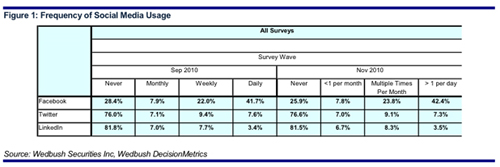
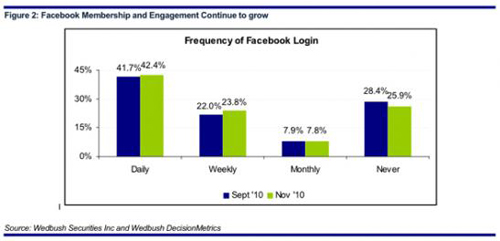

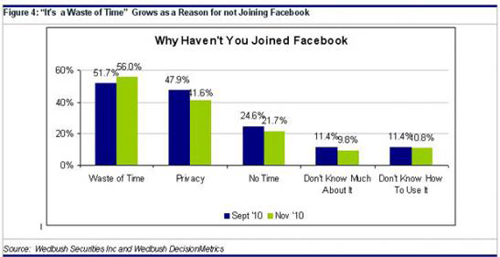
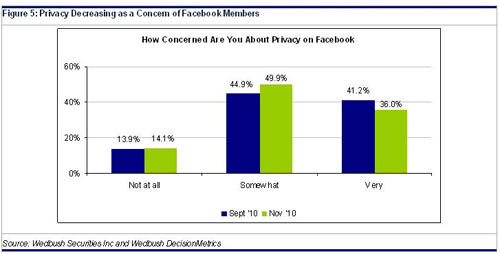
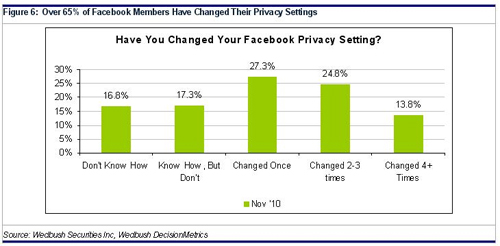
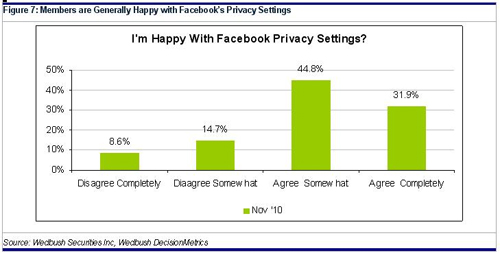

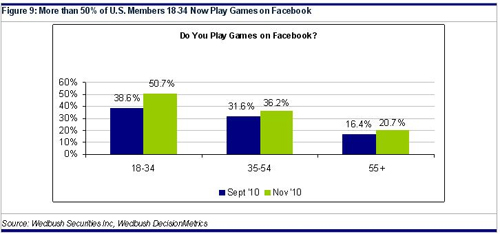
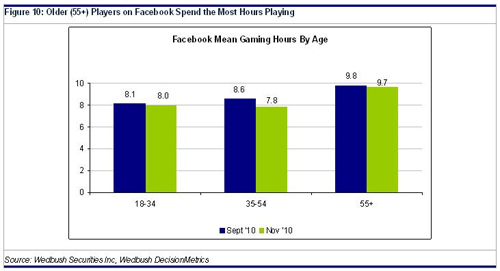
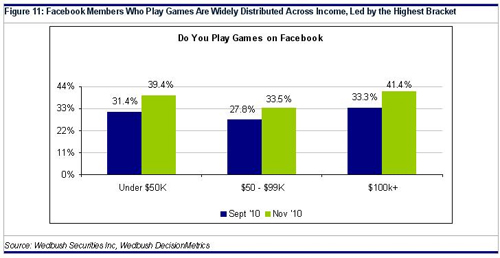
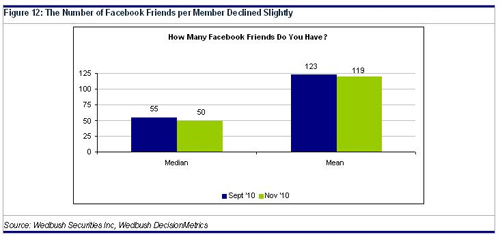
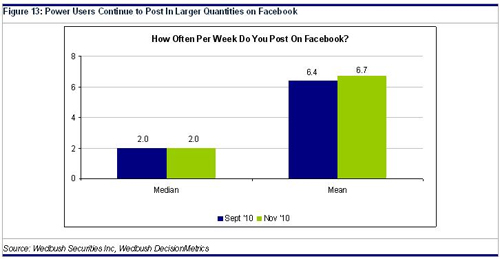


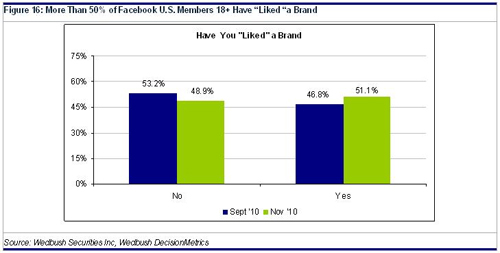
















 闽公网安备35020302001549号
闽公网安备35020302001549号